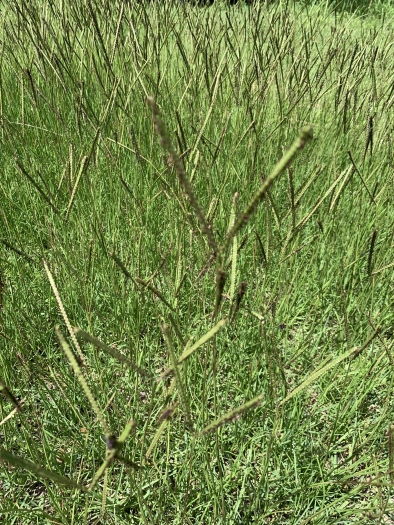Bahiagrass
(Paspalum notatum)
Bahiagrass (Paspalum notatum)
/
/

岸本年郎
CC BY 4.0
Image By:
岸本年郎
Recorded By:
Copyright:
CC BY 4.0
Copyright Notice:
Photo by: 岸本年郎 | License Type: CC BY 4.0 | License URL: http://creativecommons.org/licenses/by/4.0/ | Rights Holder: 岸本年郎 | Publisher: iNaturalist | Date Created: 2022-07-11T04:21:12Z |






















Estimated Native Range
Summary
Paspalum notatum, commonly known as Bahiagrass, is a perennial grass originally native to the open grasslands and savannas of Mexico, Central America and South America, but now also naturalized in the southeastern United States. It forms a dense turf with deep roots and is characterized by its wide, flat blades and V-shaped seed heads. Bahiagrass typically grows to a height of 12 to 24 inches (30 to 60 cm). Its flowers are inconspicuous, and it primarily reproduces by seeds and rhizomes.
Bahiagrass is valued for its drought tolerance and ability to thrive in poor, sandy soils, making it a popular choice for lawns, pastures, and erosion control in warm climates. It is often used in areas where other turfgrasses may struggle, such as in roadside verges and utility areas. In cultivation, Bahiagrass prefers full sun but can tolerate light shade. It requires minimal maintenance and can survive with little fertilization and infrequent mowing. However, its aggressive nature and potential to spread via seeds and rhizomes can make it a problematic invasive species outside its native range.CC BY-SA 4.0
Bahiagrass is valued for its drought tolerance and ability to thrive in poor, sandy soils, making it a popular choice for lawns, pastures, and erosion control in warm climates. It is often used in areas where other turfgrasses may struggle, such as in roadside verges and utility areas. In cultivation, Bahiagrass prefers full sun but can tolerate light shade. It requires minimal maintenance and can survive with little fertilization and infrequent mowing. However, its aggressive nature and potential to spread via seeds and rhizomes can make it a problematic invasive species outside its native range.CC BY-SA 4.0
Plant Description
- Plant Type: Grass
- Height: 0.7-2.3 feet
- Width: 2-3 feet
- Growth Rate: Moderate, Rapid
- Flower Color: N/A
- Flowering Season: Summer, Fall
- Leaf Retention: Deciduous
Growth Requirements
- Sun: Full Sun
- Water: Medium
- Drainage: Medium
Common Uses
Erosion Control, Groundcover, Low Maintenance
Natural Habitat
native to the open grasslands and savannas of Mexico, Central America and South America, but now also naturalized in the southeastern United States
Other Names
Common Names: Common Bahia grass, Pensacola Bahia grass, Amerika-Suzume-No-Hie, Bai Xi Cao
Scientific Names: , Paspalum notatum, Paspalum distachyon, Paspalum distachyon, Paspalum notatum subsp. latiflorum, Paspalum notatum subsp. typicum, Paspalum notatum var. latiflorum, Paspalum notatum var. notatum, Paspalum notatum var. typicum, Paspalum saltense
GBIF Accepted Name: